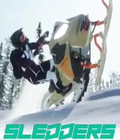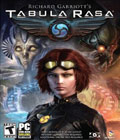From the ashes of an ancient conflict, a cosmic war threatens all sentient beings with extinction. As the alien Benefactors and Bane amass their forces for the final battle, the galaxy’s last free sentient beings are the thin line between life and death, between good and evil.
Explore lush forest planets, volcanic moons, and exotic alien civilizations. Face off against powerful xenophobe soldiers, armored mechanoids, and vicious predators! Use a wide range of weapons and unique magical alien powers to help the Allied Free Sentients (AFS) in their desperate fight against extinction. Tabula Rasa combines a vast, persistent game world and ongoing storyline with fast-paced action, resulting in a striking new approach to the design of multiplayer online games.
In Tabula Rasa there are many steps involved in creating the rich story line of the world. First of all, we’ve amassed an overarching story which includes lots of detailed back-story the player may never see and branches far out into plot twists and turns that we’ll touch on in future expansions. Next, that fiction is trimmed down leaving the content that the player will visit in game. This is then split amongst all the overland maps (the persistent maps that are shared amongst all players) in the game world. Each overland map then links to about three or four instance maps that provide more unique content for individual parties. It is here that we can more intimately progress the story for each overland map.
One of the fundamental goals for Richard Garriott’s Tabula Rasa was to simulate a war by creating what we call a dynamic battlefield. One of the ways we did that was to have the NPCs fight each other, but we wanted to take these battles a step further where they didn’t just fight each other sporadically as they encountered each other. Instead, we wanted them to actually fight over key pieces of territory which could alter the game environment in that area. These key territories are control points, and they are an integral part of what defines our dynamic battlefields.
Of course, there are more elements to the dynamics of the battlefield, but the control points are certainly a keystone of it. When the control points change ownership from the AFS to the Bane, for example, that changes a bunch of variables in the environment, including what NPCs are spawning and where they are spawning. In addition, this affects what missions are available to the players, so control point ownership even directly influences a player’s ability to complete missions. And it makes sense. If you were a soldier and had been asked to deliver a field report, for instance, and the destination base was under heavy attack, it’s unlikely you could just wander in, deliver your report, and then move on. You would more likely be ordered to help defend the outpost, or in the least, volunteer to stay and assist in the battle. Similarly, when I wander into a specific area in game that is under attack, I have to make an important decision, because what I’m fighting and where I’m fighting is directly linked to the control point. The fluid nature of where the front lines are and the ebb and flow of the battlefield is directly connected to the control points. As a result, a player’s decision to defend a control point personally impacts the face of that particular map.
Whether players decide to defend a base or take a base back from the enemy, they are still directly impacting the surrounding area. If they stay and fight to defend a base, they help ensure that it remains in the hands of the Allies, and ensures that the missions and NPCs in that base are available to other players. Likewise, if they seek out an enemy base, or fight to re-take an AFS base that has been captured by the Bane, they are deciding the extent of the front lines in that area, and how many resources are available to them as well as the players around them. In this way, the players are constantly reshaping and influencing the game environment.
Control points add a definite level of excitement to the game as well. I remember a really fun experience with the control points system, back when they were first implemented into Tabula Rasa. I’ll have to explain the background of this a bit. When the enemy takes and holds a control point, one of the things players can no longer access is the waypoint system within the base. Well, as we were first integrating the control points into the game, the waypoints were not set up to switch off, so we could teleport into a base even when it was under ownership of the Bane. So, I teleported into Wilderness LZ during one of my regular play sessions, only to find that it was no longer in AFS control. There were at least twenty Bane all around me. It was like one of those moments in an old western where a guy walks into a bar, the music screeches to a halt, and suddenly everyone is ducking for cover. I stood there a moment, and then they all open fire on me. It was a huge adrenaline rush and a lot of fun running back to the base with reinforcements to take it back. There was a real sense of satisfaction in clearing the last of the Bane out of that base.
There are other reasons to take or hold a control point as well. A direct and very compelling incentive is, as I mentioned before, if a player needs to complete a mission that ends in a base that has been taken by the enemy. The player may have to step out of his usual routine and to re-take the base before being able to complete the mission. Similarly, if they need to use a vendor or hospital in the area and the base is not under AFS control, they will not be able to do so. Recapturing the base at that point is not only in their best interest, but also benefits all of the players in that area. We have also introduced collectable medals that players receive for successfully defending or taking back a control point. These medals can then be turned in for other rewards, as an added incentive.
Taking and keeping control points also lends itself well to several aspects of the high-level content in Tabula Rasa. For example, some control points will be very challenging to take and even more challenging to keep unless a large group of players is holding it—a clan perhaps. Of course, this provides a player with “bragging rights,” but it is also a large incentive for other clans to try and take the control point for themselves. Eventually, I feel that that the control point system will evolve in such a way that the players who hold a control point will receive some sort of incentive or bonus for their efforts, making the stakes even higher for groups that want to hold ownership of a base.
My personal passion for the game really revolves around that main goal of simulating a war and making parts of the environment a little more unpredictable and dynamic then we’ve done previously. I remember the first time we got the control point system working the way we wanted it to. I logged in and started following my usual routine and completing my current mission. When I got to the base to meet with my contact, there was a huge mass of Bane outside, right between me and where I needed to be. Suddenly I had to rethink what I was going to do. I had to figure out how I was going to get into the base. The main entrance was heavily guarded, so I tried going around and sneaking in, and I kept getting shot when I got too close. It was great, because all of a sudden, I was taken out of my regular routine. I felt like there was really a war going on and I suddenly had a chance to do something very exciting when I wasn’t initially expecting to. I could take back the control point and make a difference in the battle for control of the Tabula Rasa universe.
Features :
- Richard Garriott’s Signature Creative Vision – Features a rich storyline with culminating experiences, immersive tactile environments and a persistent plot.
- Mystical “Logos” Language & Powers – Alien mystical language and powers allow players to harness the very fabric of the cosmos for heals, attacks and more!
- Ethical Parables – Players encounter ethical decisions while attempting to complete goals or missions that affect the people and environments around them.
- Brings Role-playing to the Battlefield – Fast-paced action involving skill, stealth and strategy combines with character growth and development (RPG) on a massive multiplayer scale (MMO).
- Battlefield Control Points – Entrenched positions on a given battlefield can change hands over the course of a battle and affect spawn points of both enemy and friendly characters.
- Character Cloning System – Explore different character paths without having to start from scratch.
- Crafting & Economy – Players will participate in crafting and selling items
- Player-vs-Player – Clans declare war on other clans, enabling voluntary PvP gameplay.
The standard edition box of Richard Garriott’s Tabula Rasa will be available at major online retailers at an expected retail price of $49.99 and at the PlayNC store. Customers will be able to purchase the recently announced Limited Collector’s Edition box from major retailers at an expected retail price of $69.99. Both products include the first month of online game play. After the first month, players will be charged a monthly subscription fee of US$14.99. Sixty-day game time cards will also be available at many North American retailers for an expected retail price of US$29.99.
Tabula Rasa, rated T (Teen), will launch in North America and Europe on November 2, 2007 (Oct. 30 for pre-orders.)
More articles about Tabula Rasa











 A heroic task awaits you. Just beyond your galaxy, an ancient malevolence has embarked upon a covetous rampage. This demonic juggernaut seeks nothing less than the total enslavement of every world it encounters. Your world could be next. Developed from the ground up to be stable, fast and fun, Tabula Rasa represents a refreshing new approach to the design of multiplayer online games.
A heroic task awaits you. Just beyond your galaxy, an ancient malevolence has embarked upon a covetous rampage. This demonic juggernaut seeks nothing less than the total enslavement of every world it encounters. Your world could be next. Developed from the ground up to be stable, fast and fun, Tabula Rasa represents a refreshing new approach to the design of multiplayer online games.










